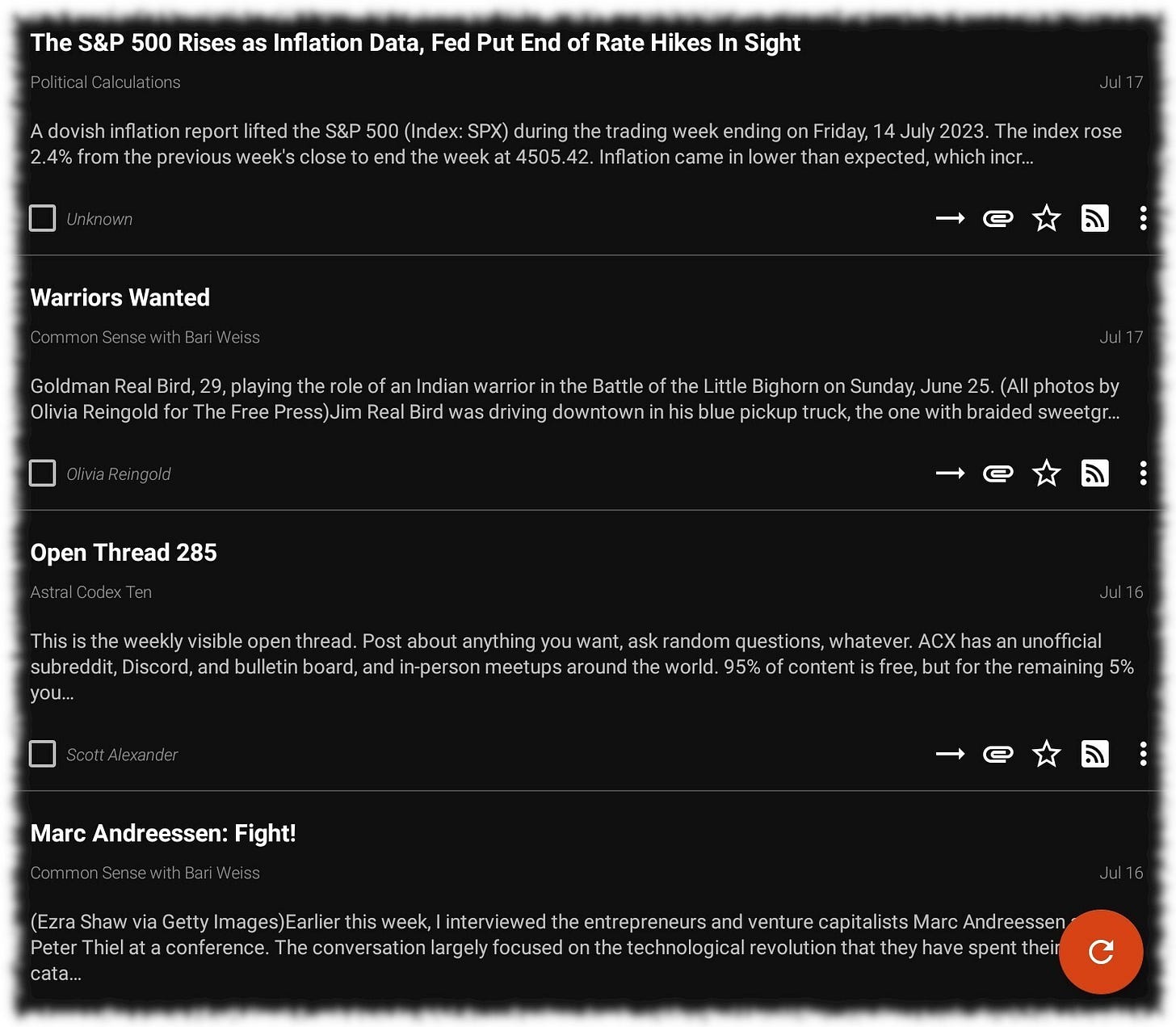Stoic Meditation #5 - Political Atheism
"An atheist is a man who has no invisible means of support." - Anonymous
In framing what it means to be both a Stoic and a political atheist, it's important to begin with what I understand the Stoic position to be with respect to public service.
We are social critters, dependent on each other whether we like or acknowledge that fact. Being a lone wolf works as a phase, not as a long-term lifestyle. As a result, there is an implicit duty toward helping each other and, in turn, helping ourselves in the process. This sense of duty and responsibility extends beyond our local tribe.
"When asked what country you are from, do not say 'I am Athenian' or 'I am from Corinth.' Say (like Socrates), 'I am a citizen of the world.'" - Epictetus, Discourses 1.9.1
The ability of any one person to influence and positively affect the world is a rare occurrence. Seeking to have an impact at that level is fraught. Any impact we can have as an individual is much more likely to be in small measures - cycling to work rather than driving, for example, probably has a vanishingly small impact on climate change. But it's an impact nonetheless. Where we can make a proportionally greater impact is by acting locally. Even those who have eventually had a global impact started out with local action.
"It is of course required of a man that he should benefit his fellow-men - many if he can; if not, a few; if not a few, those who are nearest; if not these, himself. For when he renders himself useful to others, he engages in public affairs." - Seneca, On Leisure 3.5
Our efforts to help others has the recursive benefit of helping ourselves.
"Nor can anyone live happily who has only himself in view, who turns everything to his own advantage; you ought to live for the other fellow, if you want to live for yourself." - Seneca, Epistles 48.2
And so a thread can be traced from our individual selves out into the world in a way that can potentially touch every living being, however slight. The quality of our extended reach, whether for good or bad, is determined by the quality of our local actions. Similar ideas can be found within Buddhist philosophy, particularly with respect to compassion and action.
There are also strong undercurrents related to self- and community-sufficiency in the sense of not relying on governments or large organizations to take care of every inconvenience encountered by an individual as they go about the business of living. The best we can hope for is that a government will be sufficiently competent to organize the things that are too expensive for cities or even states to handle, such as maintaining an army for defense, building a network of highways, or putting a man on the moon.
"What do we admire? Externals. What do we spend our energies on? Externals. Is it any wonder, then, that we are in fear and distress? How else could it be, when we regard the events that are coming as evil? We can’t fail to be afraid, we can’t fail to be distressed. Then we say, “Lord God, let me not be distressed.” Moron, don’t you have hands? Didn’t God make them for you? So are you going to sit down and pray that your nose will stop running? Better to wipe your nose and stop praying. What, then - has he given you nothing to help with your situation? Hasn't he given you endurance, hasn't he given you greatness of spirit, hasn’t he given you courage?" - Epictetus, Discourses 2.16.11-14
We are in an age of heightened political randomness and chaos. History teaches us that bubbles like this are cyclical. It also teaches us we somehow muddle through. Big bubbles almost always burst at great cost once the unintended consequences of those with power and "The Answer" have played out. Coupled with randomness and chaos is the considerable amplification of fear, uncertainty, and doubt enabled by the social media crap bolted onto the Internet. A perfect storm for the rise of high tech superstition and a new breed of zealots preaching "fact based" religions.
In such times, how can we keep our bearings and continue to move forward?
Political Atheism
René Girard is credited with the phrase "political atheist." It captures perfectly my position on most political issues that crowd public discourse today.
Broadly speaking, an "atheist" is characterized as someone who doesn't believe in or denies the existence of any God or Gods. In this sense, it's a term that speaks to someone's purely subjective position on fundamental spiritual matters related to divine powers.
The path of a "political atheist" is contextualized to secular matters and human activities. As a political atheist, I neither believe in or accept the possibility that any one human or group of humans can manifest the powers usually attributed to the Gods. No president of the country or particular political party or tech oligarch has the power to cure our ills and fix the world. If history has shown us anything it's that such people have the power to seriously screw things up and compound our ills - good intentions notwithstanding.
The same goes for political theories and declarations that have been elevated to "sacred" status by the evangelists and proselytizers who claim to have a monopoly on how to interpret and implement the man-made directives. There are, of course, matters of degree to consider when evaluating recorded words and I certainly have my own opinions about which theories are workable from those that aren't. But I've found it more auspicious to keep these opinions to myself and act according to my values (predominately Buddhist and Stoic) and what I understand to be true based on classic scientific evidence.
The path of a "political atheist" is contextualized to secular matters and human activities.
Practicing political atheism has become essential to maintaining a sense of agency and overall mental health. The guidelines, as I conceptualize them, are straightforward.
Politics should be desacralize. Always. Politics are a human invention and not divinely inspired mandates, actions, or truths. Likewise with the self-ordained clerisy of any particular political religion. Imbuing any human with sacred authority, whether self-proclaimed or voiced by an enthralled fan-base, over political matters is a clear sign of danger. Such people and their followers are worthy only of harsh mockery, ridicule, and contempt. If unchecked, they can become very dangerous people.
The idea that any one person or collection of people can cure or save the planet from whatever ills us is absurd. Those claiming to have "The Answer" are to be rejected as ignorant of complex systems, regardless of how highly credentialed they may be. It's important to keep in mind that human beings are...well, human beings.
Beware the gleichschaltung! A fabulous German word that translates to "coordination," "synchronization," or "bringing into line" and captures a wide swath of tactical maneuvers to watch for among political zealots and their minions. Gleichschaltung is accomplished incrementally by implementing laws, product marketing strategies, narratives, decrees, and purges designed to remove or replace individuals, organizations, and institutions (including the idea of "family") that do not conform to whatever political religion the self-appointed clerisy are peddling. Examples:
The manipulation of luxury language in support of luxury beliefs.
The "wokification" of consumer goods, entertainment, medicine, and science.
The prevailing "cancel culture" as a the modern day version of purging that in the past was accomplished through more brutal means.
Increasingly minute regulations, designed by unelected bureaucrats, that carry disproportionately harsh penalties.
Look first to make an impact locally - with family and community. This is to say being a political atheist doesn't mean a rejection of being a good citizen or disengaging from politics altogether, just those that have become religious crusades. Participate in politics rather than consume them. It's at the level of national, party, and global politics where most of the religious fervor is found and much of what happens at this level is transitory or superficial and outside our ability to influence directly. As political atheists, we aren't concerned with making broad judgments on emergent situations based on scant and unreliable information. This lessens our cognitive load and frees up valuable resources for working on differences that make a difference.
So there you have it. Stoicism and political atheism offer a way to remain a responsible citizen of the world while supporting our mental health and connecting on a deeper level with our fellow human beings. It's simple, straightforward, and much less exhausting.
Tactical Actions to Support Political Atheism
Here are some of the things I've done to make living as a political atheist possible. Not all the options are available to everyone, depending on your technical savvy and willingness to make an effort. Unsurprisingly, it's a matter of acting with intention as you work to turn some things off and turn other things on.
Pull the news you want rather than have it fed to you. To do this effectively, you pretty much have to forgo any video from the main stream media. I use an RSS reader and filter out the ads, images, videos and other garbage with keywords and names of people who manufacture garbage. I can quickly scan what's in my feed and read only what I'm interested in. An example view of my RSS reader:
Cancel and, if you can, delete your social media accounts. As a prelude to this, go on a 30 day "digital fast" to determine which, if any, social media accounts you actually need. Except for LinkedIn, I do not have any social media accounts. I'm paying less and less attention to LinkedIn as it becomes more and more Facebooky.
In social settings, if you're obliged to listen to someone's Left or Right rant, play ignorant and ask them how they came to the position they have. I always learn something from this, either about the person's cognitive machinery or, less common, the topic.
If asking questions in a social setting starts to move in a direction that is even less enjoyable, I work to change the subject. The more jarring the non sequitur, the better. "Did you know Hungary is the horseradish capital of the world, producing 12,000 metric tonnes a year?"
If you volunteer, do so with organizations that are apolitical, or should be. If they become politicized, stop volunteering. I volunteer with a garden organization and while I'm certain there are a wide spectrum of political beliefs resident in the other volunteers, it's refreshing how little of it spills into conversations about eriophyid mites and finger gall.
If you find that someone on the Internet is wrong…well:
If you shoot back a twelve-page rebuttal
With an indexed list of their lies
They'll laugh like demented hyenas
As engagement metrics rise
If you even admit their existence
Then you're falling for their trick
Let them rot in their lair as you starve them of air
It's bad on purpose to make you click.
Scott Alexander, "It's Bad On Purpose To Make You Click"
If you have any questions, need anything clarified, or have something else on your mind, please use the comments section or email me directly.
Photo by Cherry Laithang on Unsplash





